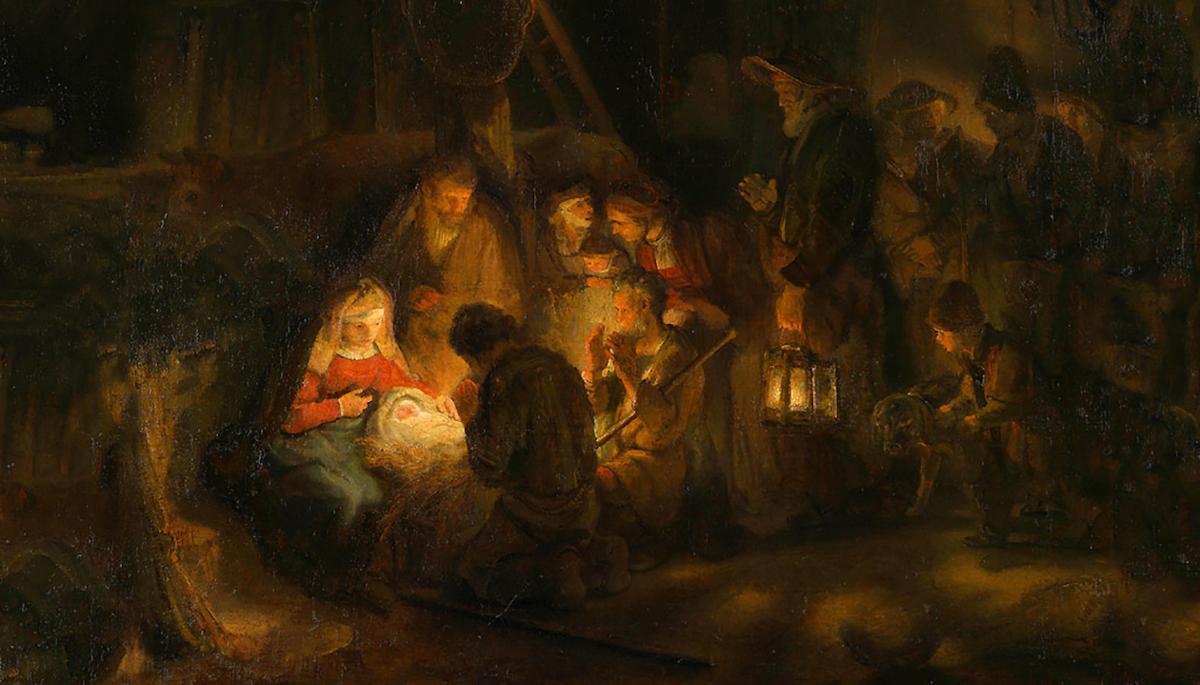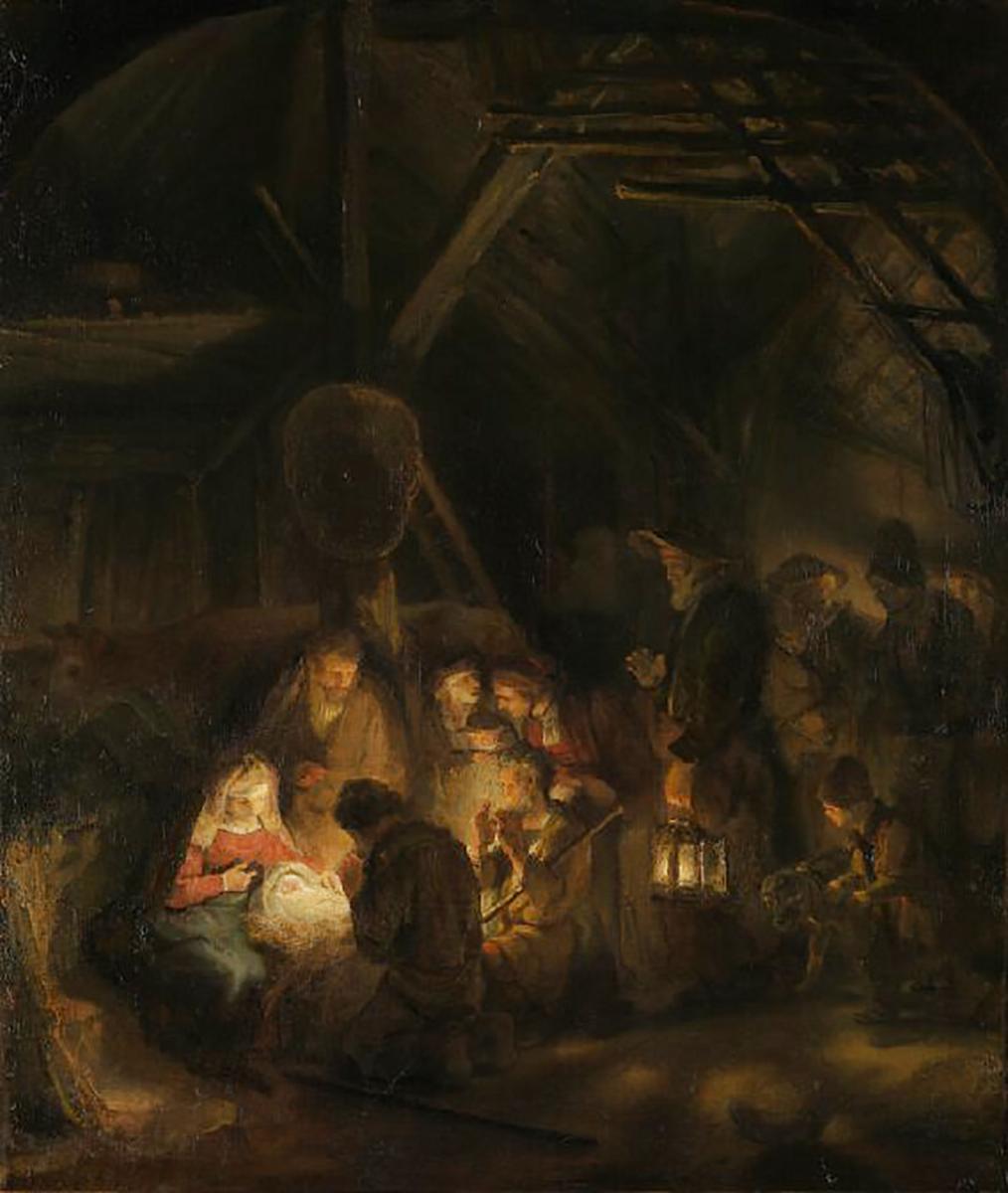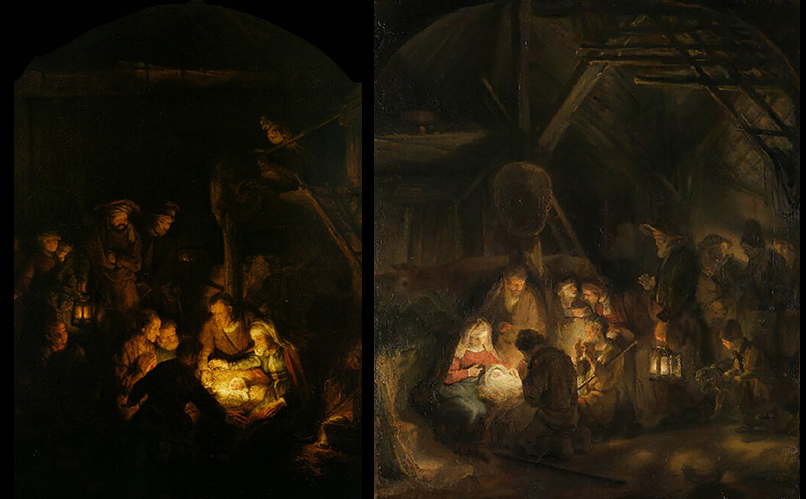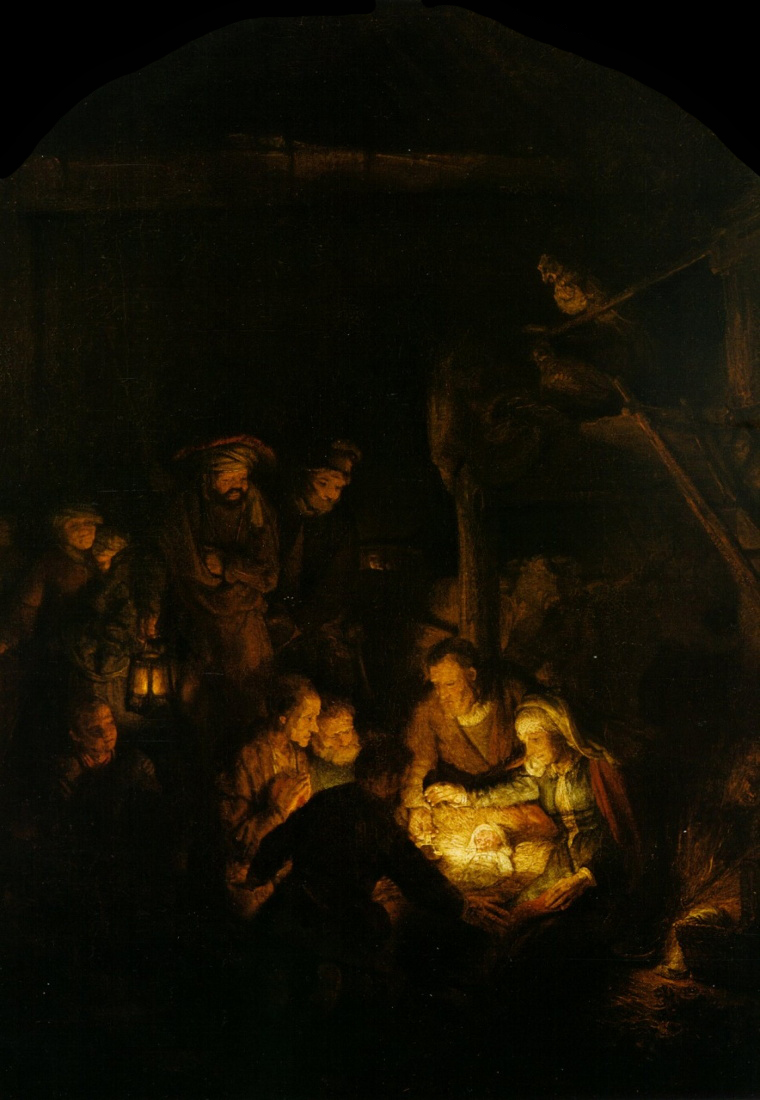December 19: The Light of the Gospel
♫ Music:
Day 17 - Tuesday, December 19
Title: The Light of the Gospel
Scripture: 2 Corinthians 4:1-6
Therefore, having this ministry by the mercy of God, we do not lose heart. But we have renounced disgraceful, underhanded ways. We refuse to practice cunning or to tamper with God's word, but by the open statement of the truth we would commend ourselves to everyone's conscience in the sight of God. And even if our gospel is veiled, it is veiled to those who are perishing. In their case the god of this world has blinded the minds of the unbelievers, to keep them from seeing the light of the gospel of the glory of Christ, who is the image of God. For what we proclaim is not ourselves, but Jesus Christ as Lord, with ourselves as your servants for Jesus' sake. For God, who said, “Let light shine out of darkness,” has shone in our hearts to give the light of the knowledge of the glory of God in the face of Jesus Christ.
Poetry:
Defect
By Luci Shaw
The flaw is no more
noticeable, even to me,
than a new moth-hole
in my sweater, or
a very bald spot
on the fabric of
my velvet vest.
Yet when
I hold the cloth
up to the window
the sunlight
bleeds through.
A HEALING GAZE ON THE LIGHT OF THE GOSPEL
It was a time when the marketplace of ideas enabled the loudest and brashest of self-promoting voices to rise to the surface, rather than those marked by wisdom, integrity and truthfulness. It was a culture where status was pursued in part through well-crafted words and even personal attack, an environment that fostered an echo-chamber of polemics among those who desired standing and recognition in the public eye.
No, this isn’t an (admittedly) cynical caricature of Twitter or Facebook (especially that space where politics and religion intersect). This is ancient Corinth, a snapshot of the cultural backdrop for Paul’s Corinthian letters, where factions in the Corinthian church brought the status-seeking and self-promoting values of the surrounding culture into the heart of the Christian community. Just a generation after Jesus’ ascension, Christians were quarreling with each other over a variety of matters related to life and faith.
Paul himself is estranged from some in the Corinthian church because of a few trouble-making voices. He writes this letter as a loving plea: the gospel, Paul reminds them, is the good news of reconciliation between God and humankind through Christ. And through Christ, God gave this ministry of reconciliation to us. Paul appeals to the Corinthian church, his coworkers in the faith, to be reconciled to each other and to him, appealing to the gospel-oriented and entirely counter cultural values of humility (4:7), meekness (10:1), weakness (12:9), and suffering (1:4). For Paul, the treasure of the gospel is not held in shiny, well-crafted porcelain, but jars of clay (4:7).
Our passage for today has much to say to a church polarized over issues surrounding gender, race and ethnicity, politics, and morality, particularly in that space where we seem to be speaking at rather than with each other. Bothered by the tense relationships he experienced with and among those in the Corinthian church, Paul offers a possible antidote to the faction-driven divisions in the Body. He encourages the fractured Corinthian church to gaze on “the light of the knowledge of the glory of God in the face of Jesus” (4:6).
And this is what we do at Christmas, where each year we follow in the footsteps of the shepherds as they obeyed the angels’ urge to go, find the promised Savior in that humble little town of Bethlehem, and gaze on the light of the glory of God in the face of Jesus. The angels sang, “Good tidings! Great joy! God is reconciling Himself to humankind!” And because of this, and this alone, we can hold steadfastly to the hope of reconciliation with each other.
I need to cling to that hope of reconciliation when difficult, emotion-filled conversations within our Church family threaten to further fracture us rather than draw us together in truth, love and understanding around the reconciling work of Jesus. Perhaps healing can begin when we together gaze on the face of Christ. Perhaps it can continue as we search our own hearts for deception, cunning or ways we ourselves might have tampered with God’s Word to get what we think is God’s way, when it may be our own.
Perhaps this season the Spirit will do a small but mighty and miraculous work of reconciliation in our relationships with each other, so that we can share God’s reconciliation with the world.
Prayer:
Lord Jesus, in this moment, we pause to present ourselves to you on behalf of your Church. We pause to gaze on the beauty of God’s glory found in your newborn face.
We ask that your Spirit would search us, know us, and show us the ways we have moved that are more about our desires than Your will. We ask that your Spirit would reveal to us ways we have used cunning or deception or tampered with your Word such that harm and destruction have been wrought upon people you deeply love. And we ask that you would forgive us.
May the splendor of your glory reorient our hearts into the deepest truths of your reconciling work for us on the cross, so that we may also be agents of reconciliation with each other.
Amen.
Lisa Igram
Associate Dean of Spiritual Development
Biola University
About the Artwork #1
The Adoration of the Shepherds, 1646
Rembrandt van Rijn
Oil on canvas
97 × 71 cm
Alte Pinakothek Art Museum
Munich, Germany
About the Artist #1:
Dutch painter Rembrandt Harmenszoon van Rijn (1606 – 1669) is considered one of the greatest artists of all time. His contributions to art came at a period of great wealth and cultural achievement known as the “Dutch Golden Age.” One of the most revered artists of all time, Rembrandt's greatest creative triumphs are seen in his portraits and self-portraits, illustrations of biblical scenes, and his innovative etchings and use of shadow and light. He is often praised for his understanding and empathy for the human condition.
About the Artwork #2:
The Adoration of the Shepherds, 1646
Pupil of Rembrandt van Rijn
Oil on canvas
65.5 x 55 cm
National Gallery
London, England
About the Artist #2:
The Adoration of the Shepherds was one of the first Dutch paintings to enter the National Gallery of London. The attribution to Rembrandt has been questioned since it is particularly similar to another painting by Rembrandt, which has the same subject and was made around the same time. Rembrandt ran a large workshop and had many pupils. The list of Rembrandt’s pupils from his period in Leiden as well as his time in Amsterdam is quite long, mostly because his influence on painters around him was so great that it is difficult to tell whether someone worked for him in his studio or just copied his style for patrons eager to acquire a Rembrandt.
About the Music:
“Vespers (All-Night Vigil) Svete Tikhyii - O Serene Light” from the album Rachmaninoff Vespers
Lyrics:
(Svete Tikhyi)
Svete tikhyi svyatyya slavy,
Bezsmertnago, Otsa Nebesnago,
Svyatago Blazhennago, Iisuse Khriste!
Prishedshe na zapad solntsa,
Videvshe svet vechernii,
Poyem Otsa, Syna i Svyatago Dukha, Boga!
Dostoin esi vo vsya vremena pet byti
Glasi prepodobnymi,
Syne Bozhii, zhivot dayai,
Temzhe mir Tya slavit.
Translation:
(O Serene Light)
O serene light of the holy glory,
Of the Immortal One, the Heavenly Father,
Holy and blessed, O Jesus Christ.
Now that we have come to the setting of the sun and behold the light of evening,
We praise the Father, Son and Holy Spirit, God.
Thou art worthy at every moment to be praised in hymns by reverent voices.
O Son of God, thou art the giver of life;
Therefore all the world glorifies Thee.
About the Composer:
Sergey Vasilyevich Rachmaninov (1873-1943), born in Semyonovo, Russia, is remembered as one of the most formidable pianists of all time and the last truly great composer in the Russian Romantic tradition. His All-Night Vigil was composed and premiered in 1915. Russia was in political turmoil at the time so it is not surprising that Rachmaninov was looking to write something more introspective than usual. The composer, an Orthodox Christian, had a deep and very personal religious faith that he expresses beautifully through this unaccompanied set of choral prayers, which he considered his greatest musical achievement. ‘The Evening Hymn of Light” (Phos Hilaron) is one of the most ancient hymns of the Orthodox Church and is based on Psalm 140 (141). While the psalm is sung, all the lights of the church are progressively lit and the priest and deacon enter the Holy of Holies.
About the Performers:
Directed by the award-winning conductor Robert Shaw (1916-1999), the Robert Shaw Festival Singers featured in this recording were a group of vocal teachers, conductors, and other choral leaders selected for the 1989 Robert Shaw Festival in Quercy, France. The festival was an esteemed, three-week intensive designed to pass on the riches of Robert Shaw's choral knowledge to a new generation of educators from around the world. Along with studies in pedagogy, the festival resulted in stunning performances and recordings in many historic French cathedrals.
About the Poet:
Luci Shaw (b. 1928) is a Christian poet who studied at Wheaton College, Illinois, and is now Writer-in-Residence at Regent College, Vancouver, British Columbia. She lectures on art and spirituality, the Christian imagination, poetry-writing, and journaling as an aid to artistic and spiritual growth. She has published ten volumes of poetry and numerous non-fiction books, and has edited and collaborated on multiple other works, including several with her dear late friend, Madeleine L'Engle. Shaw usually works in free verse, and typically her poems are short. Nevertheless, in tone and content, she affiliates most readily with the transcendental poets, often finding in natural details and themes, the touch of the eternal or other-worldly. For over 60 years Shaw has had a tradition of sending Advent greetings to friends and family and with each year’s greeting she often includes a new Advent poem.
About the Devotional Writer:
Lisa Igram’s 15 years in higher education include a variety of classroom-teaching and co-curricular programming experiences in the U.S. and abroad. She joined the Spiritual Development staff in 2012, where she especially enjoys opportunities to teach and train in spiritual formation and connect one-on-one with students



